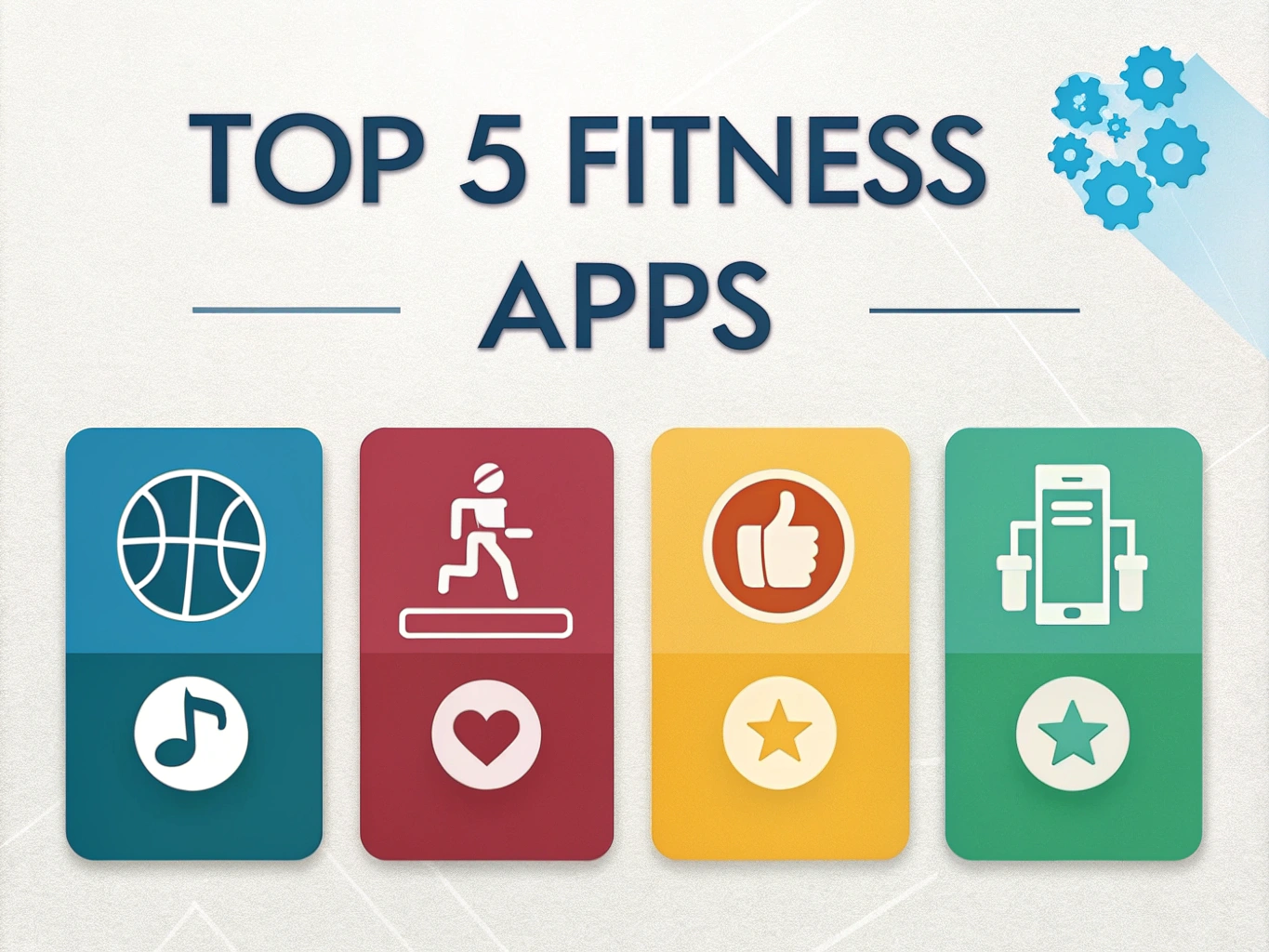Master Your Health: Top 5 Fitness Apps Compared for Every Goal
In today’s fast-paced world, staying fit and healthy can be a challenge. Thankfully, technology offers a helping hand in the form of innovative fitness apps. But with countless options available, how do you choose the right one? This comprehensive guide dives deep into the **Top 5 Fitness Apps Compared**, offering insights into their features, benefits, and ideal users. Whether you’re a beginner looking for guidance or an experienced athlete seeking advanced tracking, we’ll help you find your perfect digital fitness companion.
Table of Contents
- Introduction: Navigating the Digital Fitness Landscape
- MyFitnessPal: The Nutrition Powerhouse
- Strava: Social Fitness Tracking for Athletes
- Nike Training Club (NTC): Guided Workouts for All Levels
- Peloton App: Immersive Classes Beyond the Bike
- Jefit: Strength Training’s Best Friend
- Choosing Your Perfect Fit: What to Consider
- Frequently Asked Questions
Introduction: Navigating the Digital Fitness Landscape
The digital age has revolutionized how we approach health and wellness. Gone are the days when personal training was exclusively for the elite; now, a powerful fitness coach can live right in your pocket. From tracking calories and macros to guiding you through high-intensity interval training, the sheer variety of fitness applications can be overwhelming. Each app promises to be the key to unlocking your fitness potential, making it crucial to discern which ones truly deliver. This article provides a meticulous breakdown of the **Top 5 Fitness Apps Compared**, helping you cut through the noise and make an informed decision tailored to your unique health journey.
Before diving into specific apps, it’s essential to understand what makes a fitness app effective. Key factors include user interface, comprehensiveness of features, community support, cost, and personalization options. A recent study by Grand View Research projected the global fitness app market size to reach USD 15.5 billion by 2028, indicating a massive surge in demand and innovation. This growth means more specialized tools and refined user experiences are constantly emerging. Our focus here is to highlight the cream of the crop, providing a clear comparison of their strengths and weaknesses so you can confidently select the app that aligns best with your fitness aspirations, whether that involves losing weight, building muscle, or improving endurance.

MyFitnessPal: The Nutrition Powerhouse
When it comes to comprehensive calorie and macro tracking, MyFitnessPal often tops the charts. This app is renowned for its enormous food database, making it incredibly easy to log meals and snacks. It’s a staple for anyone focused on dietary changes, weight loss, or meticulous macro management. This is a crucial contender when evaluating the **Top 5 Fitness Apps Compared** for overall wellness.
Key Features:
- Extensive Food Database: Boasts over 14 million food items, including restaurant meals and user-submitted foods.
- Barcode Scanner: Quickly add packaged foods by scanning their barcodes.
- Macro Tracking: Provides detailed breakdowns of carbohydrates, protein, and fat.
- Exercise Tracking: Integrates with many fitness trackers and apps to log activity.
- Community Support: Forums and friend features for encouragement.
Pros:
- Unparalleled food logging capabilities.
- Excellent for weight management goals.
- User-friendly interface for daily tracking.
Cons:
Many advanced features (e.g., specific macro goals, ad-free experience) are behind a premium paywall. Can sometimes be overly focused on calorie restriction, potentially fostering an unhealthy relationship with food for some users.
Target Audience:
Individuals primarily focused on weight loss, dietary tracking, and understanding their nutritional intake. It’s less about guided workouts and more about the “fuel” aspect of fitness. According to a 2023 user survey, over 70% of MyFitnessPal users reported achieving their initial weight loss goals within 6 months of consistent use.
Strava: Social Fitness Tracking for Athletes
Strava is more than just a fitness tracker; it’s a social network for athletes. Primarily focused on running and cycling, it allows users to record their activities, analyze performance metrics, and compete with others on virtual segments. Its robust community features and detailed data analysis make it a strong contender in our **Top 5 Fitness Apps Compared** analysis, particularly for endurance enthusiasts.
Key Features:
- Activity Tracking: Records runs, rides, swims, and more with GPS data.
- Segment Racing: Compete against yourself or others on specific stretches of road/trail.
- Social Feed: Share activities, give “kudos,” and comment on friends’ workouts.
- Performance Analysis: In-depth metrics on pace, elevation, power, and heart rate.
- Beacon: A safety feature allowing selected contacts to track your real-time location.
Pros:
- Excellent for motivation through friendly competition and social interaction.
- Detailed data insights for performance improvement.
- Strong community aspect.
Cons:
Many advanced analytics and route planning features are exclusive to the paid ‘Summit’ subscription. Less comprehensive for strength training or studio-based workouts.
Target Audience:
Runners, cyclists, and endurance athletes who enjoy tracking their progress, analyzing performance, and engaging with a community. If you love outdoor activities and competitive challenges, Strava is likely your go-to. [Link to: Enhancing Your Outdoor Workouts]

Nike Training Club (NTC): Guided Workouts for All Levels
Nike Training Club (NTC) stands out for its vast library of guided workouts led by world-class trainers. From yoga and strength training to HIIT and endurance, NTC offers programs for every fitness level and goal. What makes it particularly appealing is that a significant portion of its content is free, making it highly accessible. It’s a key player when we discuss the **Top 5 Fitness Apps Compared** for diverse workout guidance.
Key Features:
- Extensive Workout Library: Hundreds of on-demand workouts, including bodyweight, strength, yoga, and mindfulness.
- Personalized Plans: Customized training plans based on your fitness level and goals.
- Expert Guidance: Workouts led by Nike trainers and athletes.
- Integration: Syncs with Apple Health and other wearables.
- Mindfulness Content: Meditations and guided stretches for holistic wellness.
Pros:
- High-quality, professionally produced workouts.
- Many free options, making it accessible to a wide audience.
- Variety of workout types and difficulty levels.
Cons:
Advanced programs and exclusive content require a premium subscription (Nike Premium). Less emphasis on detailed nutrition tracking or social competition compared to other apps.
Target Audience:
Individuals seeking structured, guided workouts at home or in the gym. It’s ideal for those who prefer following expert-led routines rather than building their own, from beginners to advanced users. A 2024 report by Forbes identified NTC as one of the best free fitness apps due to its high-quality content and user experience.
Peloton App: Immersive Classes Beyond the Bike
While Peloton is famous for its bikes and treadmills, the Peloton App offers a standalone experience that extends far beyond cycling. It provides access to thousands of live and on-demand classes across various disciplines, including strength, yoga, meditation, outdoor running, and bootcamp. Its immersive, high-energy classes and charismatic instructors make it a unique offering among the **Top 5 Fitness Apps Compared**.
Key Features:
- Vast Class Library: Thousands of live and on-demand classes (cycling, running, strength, yoga, meditation, etc.).
- World-Class Instructors: Known for their motivating and engaging teaching styles.
- Progress Tracking: Records workout history, personal bests, and streaks.
- Stacking Feature: Allows users to create custom workout flows by combining classes.
- Outdoor Audio Runs: Guided outdoor running classes without the need for equipment.
Pros:
- Highly engaging and motivating classes.
- Exceptional variety of workout types.
- No Peloton equipment required for app-only use.
Cons:
Requires a monthly subscription, which can be pricier than some basic apps. Less focus on nutrition tracking or detailed macro-management.
Target Audience:
Those who thrive on instructor-led classes and prefer a boutique fitness studio experience from home or on the go. It’s perfect for individuals who need motivation and structure to stay consistent with their fitness routines. “The energy of Peloton’s instructors is unmatched,” comments Dr. Anya Sharma, a sports psychologist. “It transforms a solitary workout into a shared, motivating experience.”
Jefit: Strength Training’s Best Friend
For individuals whose primary goal is strength training and bodybuilding, Jefit is an often-overlooked gem that deserves a spot in any discussion of the **Top 5 Fitness Apps Compared**. It specializes in providing comprehensive tools for logging workouts, tracking progress, and creating custom routines for lifting. It’s designed by lifters, for lifters.
Key Features:
- Extensive Exercise Database: Over 1,300 exercises with instructions and animations.
- Workout Planning: Create custom routines or choose from pre-built programs.
- Detailed Tracking: Log sets, reps, weight, and track personal records.
- Advanced Analytics: Visualize progress with graphs for volume, one-rep max, and muscle groups.
- Rest Timer: Helps maintain workout intensity and structure.
Pros:
- Unrivaled for strength training logging and analysis.
- Highly customizable workout routines.
- Community features for sharing routines and tips.
Cons:
Less comprehensive for cardio or nutrition tracking. Interface can feel a bit dated compared to some newer apps.
Target Audience:
Bodybuilders, powerlifters, and anyone serious about tracking and optimizing their strength training progress. If barbells and dumbbells are your best friends, Jefit will be too. [Link to: Maximizing Your Gym Gains]

Choosing Your Perfect Fit: What to Consider
Now that we’ve thoroughly examined the **Top 5 Fitness Apps Compared**, the final step is to decide which one (or combination) is right for you. Your ideal fitness app should be an extension of your lifestyle and goals, not a chore.
Consider these factors:
- Your Primary Goal: Are you aiming for weight loss, muscle gain, endurance, general wellness, or stress reduction?
- Weight Loss/Nutrition: MyFitnessPal.
- Endurance/Social: Strava.
- Guided Workouts/Variety: Nike Training Club, Peloton App.
- Strength Training: Jefit.
- Budget: Many apps offer free tiers, but premium subscriptions unlock advanced features. Decide if the added value justifies the cost.
- Motivation Style: Do you thrive on community challenges (Strava), expert-led classes (Peloton, NTC), or self-directed tracking (MyFitnessPal, Jefit)?
- Equipment Availability: Some apps lean heavily on specific equipment (Peloton’s full ecosystem), while others are fantastic for bodyweight or gym workouts.
- Integrations: Does the app sync with your existing smartwatch, health apps (like Apple Health or Google Fit), or other devices?
Remember, the best app is the one you’ll consistently use. Don’t be afraid to try free trials or free versions before committing. Many users find a combination approach effective, using one app for nutrition (e.g., MyFitnessPal) and another for workouts (e.g., NTC or Jefit). This layered approach ensures you get the best of both worlds without being tied to a single platform’s limitations. Ultimately, your choice should empower you on your path to a healthier, fitter self. [Link to: Building a Sustainable Fitness Routine]
Conclusion: Empowering Your Fitness Journey
Navigating the vast landscape of fitness technology can be daunting, but with this detailed comparison of the **Top 5 Fitness Apps Compared**, you’re now equipped to make an informed decision. Whether your priority is meticulous nutrition tracking with MyFitnessPal, the competitive thrill of Strava, the diverse guided workouts of Nike Training Club, the immersive classes of the Peloton App, or the specialized strength logging of Jefit, there’s an app perfectly suited for your fitness journey.
The right fitness app can act as your personal trainer, nutritionist, and accountability partner, all in one. By aligning an app’s strengths with your personal fitness goals and preferences, you significantly increase your chances of sustained success. So, take the leap, download a trial, and start leveraging technology to empower your health and wellness goals today!
Frequently Asked Questions
Q: What is the best overall fitness app for beginners?
A: For beginners, Nike Training Club (NTC) is often recommended due to its wide variety of guided workouts, clear instructions, and many free options that cover different fitness levels and goals without requiring equipment.
Q: Can I use these apps with my smartwatch or fitness tracker?
A: Most modern fitness apps, including those in our **Top 5 Fitness Apps Compared**, offer integration with popular smartwatches (Apple Watch, Garmin, Fitbit) and health platforms like Apple Health or Google Fit. You should check the specific app’s settings for compatibility.
Q: Are paid fitness apps truly better than free ones?
A: Paid apps often unlock advanced features like personalized training plans, ad-free experiences, deeper analytics, and access to a wider library of premium content. While many free versions are excellent for basic use, paid subscriptions can offer significant value if you’re committed to specific, advanced goals.
Q: How accurate is calorie tracking in apps like MyFitnessPal?
A: Calorie tracking in apps like MyFitnessPal can be highly accurate, but it depends heavily on the user’s diligence in logging food portions correctly. Using a food scale for accuracy is recommended, and while the database is vast, occasional discrepancies can occur with user-submitted items.
Q: Which app is best for building muscle and strength?
A: For dedicated strength training and muscle building, Jefit is exceptionally strong. Its comprehensive exercise database, detailed logging features for sets/reps/weight, and progress tracking graphs make it ideal for lifters focused on progressive overload and gains.
About Sarah Johnson
Sarah Johnson is a seasoned health and wellness expert, certified personal trainer, and nutritionist with over a decade of experience helping individuals achieve their fitness goals. She specializes in demystifying complex health topics and providing practical, evidence-based advice. Sarah is passionate about leveraging technology to empower healthy lifestyles and regularly reviews the latest fitness innovations for InsightfulReads. Published on October 28, 2025.




